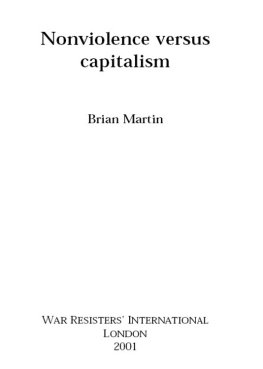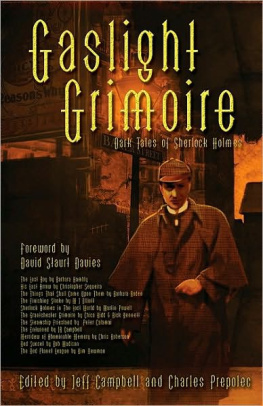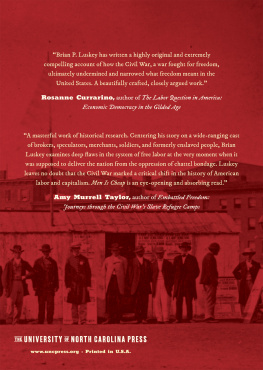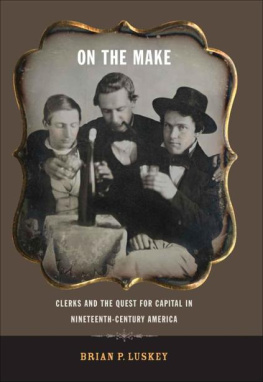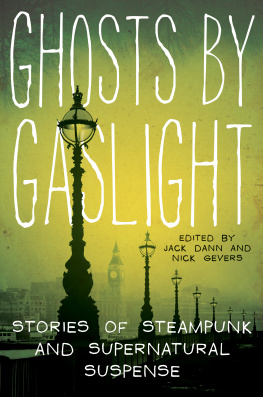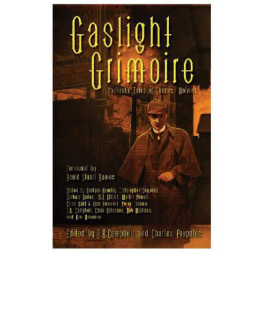Luskey Brian P. - Capitalism by Gaslight
Here you can read online Luskey Brian P. - Capitalism by Gaslight full text of the book (entire story) in english for free. Download pdf and epub, get meaning, cover and reviews about this ebook. year: 2015, publisher: University of Pennsylvania Press, Inc., genre: Politics. Description of the work, (preface) as well as reviews are available. Best literature library LitArk.com created for fans of good reading and offers a wide selection of genres:
Romance novel
Science fiction
Adventure
Detective
Science
History
Home and family
Prose
Art
Politics
Computer
Non-fiction
Religion
Business
Children
Humor
Choose a favorite category and find really read worthwhile books. Enjoy immersion in the world of imagination, feel the emotions of the characters or learn something new for yourself, make an fascinating discovery.

- Book:Capitalism by Gaslight
- Author:
- Publisher:University of Pennsylvania Press, Inc.
- Genre:
- Year:2015
- Rating:3 / 5
- Favourites:Add to favourites
- Your mark:
- 60
- 1
- 2
- 3
- 4
- 5
Capitalism by Gaslight: summary, description and annotation
We offer to read an annotation, description, summary or preface (depends on what the author of the book "Capitalism by Gaslight" wrote himself). If you haven't found the necessary information about the book — write in the comments, we will try to find it.
Capitalism by Gaslight — read online for free the complete book (whole text) full work
Below is the text of the book, divided by pages. System saving the place of the last page read, allows you to conveniently read the book "Capitalism by Gaslight" online for free, without having to search again every time where you left off. Put a bookmark, and you can go to the page where you finished reading at any time.
Font size:
Interval:
Bookmark:
Capitalism by Gaslight
EARLY AMERICAN STUDIES
Series editors:
Daniel K. Richter, Kathleen M. Brown,
Max Cavitch, and David Waldstreicher
Exploring neglected aspects of our colonial, revolutionary, and early national history and culture, Early American Studies reinterprets familiar themes and events in fresh ways. Interdisciplinary in character, and with a special emphasis on the period from about 1600 to 1850, the series is published in partnership with the McNeil Center for Early American Studies.
 BY
BY 
GASLIGHT
Illuminating the Economy
of Nineteenth-Century America
Edited by
Brian P. Luskey
and
Wendy A. Woloson

Copyright 2015 University of Pennsylvania Press
All rights reserved. Except for brief quotations used for
purposes of review or scholarly citation, none of this book
may be reproduced in any form by any means without
written permission from the publisher.
Published by
University of Pennsylvania Press
Philadelphia, Pennsylvania 19104-4112
www.upenn.edu/pennpress
Printed in the United States of America on acid-free paper
1 3 5 7 9 10 8 6 4 2
Library of Congress Cataloging-in-Publication Data
Capitalism by gaslight : illuminating the economy of nineteenth-century America / Brian P. Luskey and Wendy A. Woloson. 1st ed.
p. cm. (Early American studies)
Includes bibliographical references and index.
1. CapitalismUnited StatesHistory19th century. 2. Informal sector (Economics)United StatesHistory19th century. 3. United StatesEconomic conditions19th century. 4. United StatesSocial conditions19th century. I. Luskey, Brian P. II. Woloson, Wendy A., 1964 III. Series: Early American studies.
HC105.C23 2015
330.973'05dc23
2014028631
Brian P. Luskey and Wendy A. Woloson
Will B. Mackintosh
Robert J. Gamble
Joshua R. Greenberg
Adam Mendelsohn
Brendan P. OMalley
Corey Goettsch
Craig B. Hollander
Michael D. Thompson
Katie M. Hemphill
Paul Erickson
Ellen Gruber Garvey
Brian P. Luskey and Wendy A. Woloson
BRIAN P. LUSKEY AND WENDY A. WOLOSON
The gaslight of Philadelphias street lamps illuminated the work of the successful entrepreneur James Francis during the Civil War era. He managed a crew of employees in two businesses. In the colder months, his team cleaned chimneys. When the weather turned warmer, he became Philadelphias Dog-Killer-in-Chief, leading his men in the grisly work of rounding up stray dogs and rendering them into wheel grease. He also caught stray pigs. This work purportedly helped him clear $1,000 a year, although the evidence suggests that he was able to save little from these earnings. The Evening Telegraph reported that a friend, the citys fire marshal Alexander Blackburn, paid for Franciss medical care, Christian consolation on his deathbed, and burial in 1864.
The fact that this man, an African American, had cultivated the regard of a white official was certainly noteworthy for the era. But such news did not lead to more widespread respect for his clear achievements. The Telegraphs obituary largely ignored Franciss good business sense and his vital role as a provider of essential services to the citys residents and employment for a number of workers. Instead, the newspaper announced that Franciss passing marked the Death of a Well-Known Character. He would be missed more for his comforting presence in the panorama of urban street life than for the economic ingenuity and hard work by which he had carved a niche for himself and other black men at the center of the citys economy and society. His white contemporaries marginalized Francis and his crew of laborers, obscuring his endeavor and their toil in the shadows of social experience and the historical record.
Francis used ingenuity and moxie just to get by. It would strain the limits of the available evidence to claim that he was, or thought himself to be, a capitalist. His white contemporaries certainly would not grant him the labels social stature as they made light of, rather than illuminated, his impressive efforts. Yet ordinary people, through their varied struggles to survive and succeed, created capitalism as much as captains of commerce and industry did. The purpose of this volume is to examine the many people, goods, transactions, strategies, and economic practices that have been obscured by nineteenth-century debates about the meanings of economic activity and more recent arguments about what constituted capitalism. The gaslight lamps of nineteenth-century cities provide a useful metaphor for us. In Capitalism by Gaslight, we bring these economies out of the shadows and illuminate them in order to better understand what capitalism was in the nineteenth century.
White Philadelphians patronizing dismissal of Francis is as much a part of nineteenth-century capitalism as Franciss hard work: Americans at the time paid quite a bit of attention to what petty entrepreneurs were doing in order to lend moral legitimacy to the markets and activities they deemed respectable and appropriate. Within these cultural debates, we can see capitalism as a contest for meaning, especially among the privileged few who had access to economic and cultural resources that enabled them to control the discourse materially and rhetorically. Merchant princes reaped the economic rewards of other peoples economic activity and also accumulated cultural capital by obscuring the exertions and creativity of those petty producers and entrepreneurs in order to validate and ennoble their own.
The markets we investigate here, often labeled marginal by contemporaries and historians, were actually central to the economy and to individuals struggles for survival and their efforts to achieve ambitions. The story of nineteenth-century American capitalism that emerges in this collection reveals a multitude of people who made markets by navigating a range of new financial instruments, information, and transactions, the fluid mobility and mutable value of people and goods, and the shifting geography and structure of commercial institutions, even as powerful capitalists denigrated the activities of petty entrepreneurs in order to legitimate their own. What is more, by uncovering what ordinary individuals actually did, the contributors to this volume go far beyond illuminating the economic and cultural past. They recover a forgotten social history as well, for petty entrepreneurs who sold used clothing or struggled to make do by pilfering cotton were simply living their lives.
We see this collection as part of a scholarly project that has begun to show, as Rosanne Currarino has argued, that capitalism was a contingent, contested, and historical process that arose and attained shape out of the messy minutiae of daily life. It is our contention that the messy minutiae that shaped the practices, habits, and worldviews of people such as James Francis helped to constitute capitalism in nineteenth-century America, a process that was gradual, highly contested, and certainly not monolithic. In order to make such a claim stick, we must establish the significance of market activity that historians have by and large dismissed as underground, marginal, and informal (and even black, illicit, or gray). These terms not only marginalize significant forms of commerce at the core of daily life but also exclude these activities from the larger history of capitalism.
Next pageFont size:
Interval:
Bookmark:
Similar books «Capitalism by Gaslight»
Look at similar books to Capitalism by Gaslight. We have selected literature similar in name and meaning in the hope of providing readers with more options to find new, interesting, not yet read works.
Discussion, reviews of the book Capitalism by Gaslight and just readers' own opinions. Leave your comments, write what you think about the work, its meaning or the main characters. Specify what exactly you liked and what you didn't like, and why you think so.

